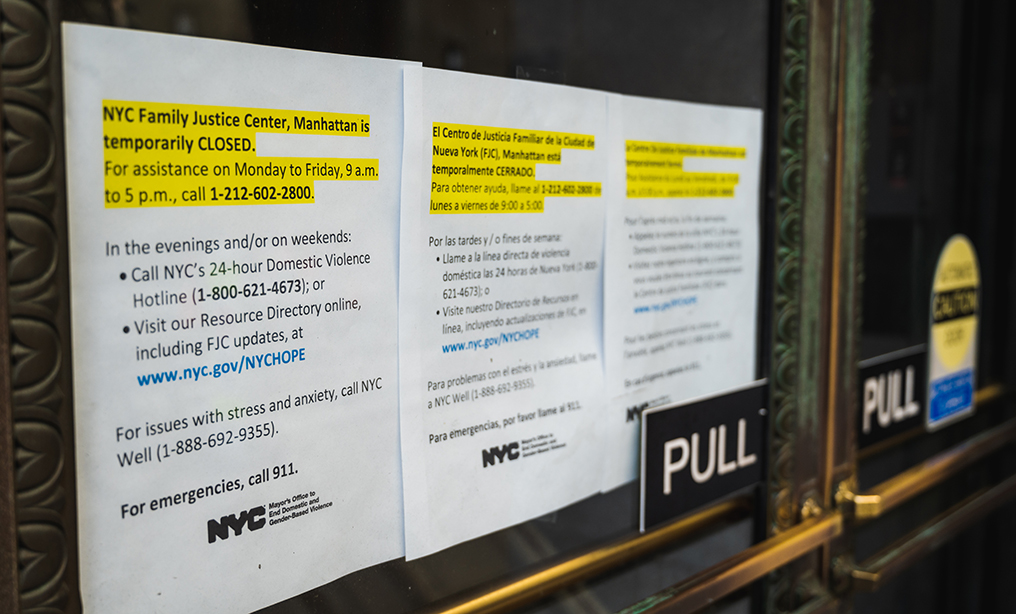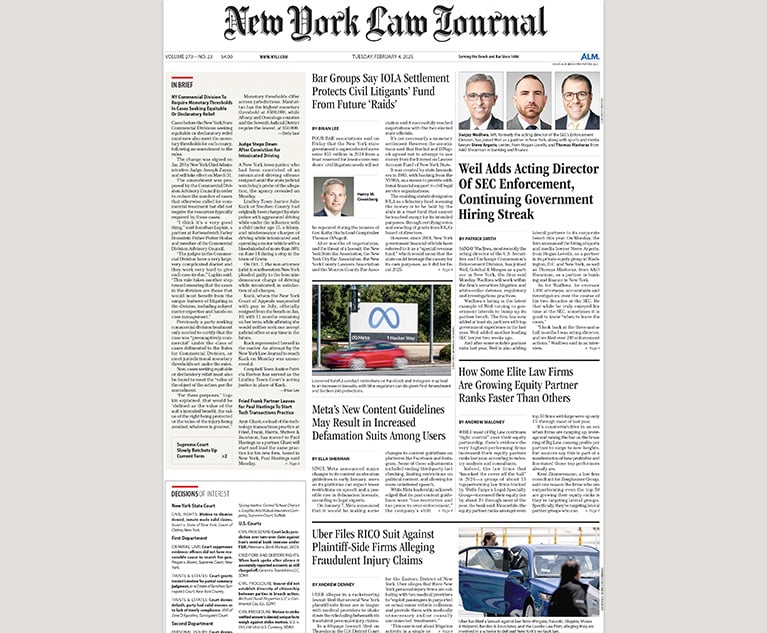Definition of 'Essential' Court Services in COVID-19 Response Begins to Come Into Focus
New York Chief Administrative Judge Lawrence Marks issued an order Sunday that defined "essential" court matters and said all other court filings would not be accepted until further notice.
March 23, 2020 at 09:54 AM
5 minute read
 Sign outside Manhattan courthouse claiming closure due to the coronavirus pandemic. Photo: Ryland West/ALM
Sign outside Manhattan courthouse claiming closure due to the coronavirus pandemic. Photo: Ryland West/ALM
New York's statutes of limitations have been paused through an executive order from Gov. Andrew Cuomo as legal operations slow in a state now at the epicenter of the nation's coronavirus pandemic.
The third-term governor on Friday signed an executive order suspending "any specific time limit" on the start or filing of any legal action notice, motion or "other process or proceeding."
The wide-ranging executive order suspending the statute of limitations applies, but is not limited to, criminal procedure law, civil practice law and the court of claims act. The order pausing those rules goes through April 19.
That same order made official sweeping mandatory lockdown rules that ordered all New York workers from "nonessential" companies to stay home, one of many restrictions nationwide that have upended daily American life.
Essential businesses were exempt from the rule, but law firms were not explicitly listed under that category.
Instead, guidance from the state government said legal service providers are considered essential businesses, but only if their work is tied to certain topics, such as supporting criminal defendants in court. That also includes supporting the essential functions of "health care providers, utilities, state and local governments, the federal government, financial institutions, businesses that have been designated as essential."
The New York City Law Department, which defends the city in civil litigation and is therefore one of the busiest defense firms in the state, reported the city's service window on Church Street in New York City is closed in light of the executive order. But the Law Department said they have established an email address for service.
Cuomo's executive order came quickly after New York lawmakers and state Attorney General Letitia James called on Cuomo to pause the statute of limitations due to the coronavirus pandemic.
A cohort of state senators, in particular, argued in a letter that suspending the legal time limits would allow people time to consult with their attorneys, report crimes and prepare claims.
As officials scramble to prepare for an anticipated deluge of new coronavirus patients, New York saw a soaring increase in the number of COVID-19 cases over the weekend, with state officials reporting Monday more than 20,800 cases statewide and upward of 150 deaths. The death toll is the highest figure among the states, officials said.
Lawrence Marks, the state's chief administrative judge, issued an order Sunday that listed which topics are considered "essential" matters and said all other court filings would not be accepted until further notice.
The list of "essential" matters includes bail applications, temporary orders of protection and applications tied to "serious code violations." The memorandum said that emergency applications tied to guardianship matters or the coronavirus in state Supreme Court would be deemed essential, along with extreme risk protection orders that ban people deemed to be a danger to themselves or others from having a firearm.
Child Victim Act lawsuits were not listed as essential under the order. The law, enacted last year, opened up a one-year window for survivors to sue over past child sexual abuse that was previously barred due to statutes of limitations.
State Sen. Brad Hoylman, who sponsored the legislation, said the pausing of nonessential court filings is necessary, but it effectively closed the one-year legal window for survivors. Instead, the Manhattan Democrat called on state lawmakers to lengthen the revival period for another year through legislation or via the state budget.
"New York promised survivors in 2019 that we'd give them a chance to seek justice—and we must live up to that promise," he said in a statement.
Lawmakers face an April 1 deadline to pass the state budget, which Cuomo often uses to push through large-scale policy priorities. He said Monday he wants to legalize marjiuana in the state budget and make changes to the state's bail law that eliminated pretrial detention for low-level and nonviolent felony cases.
New York is moving to increase the state's hospital capacity to fend off an expected crush on the health care system, enlisting more health care professionals and delivering a mandate that hospitals increase their capacity by at least half.
Last week, Cuomo projected that New York could need 110,000 hospital beds by early May to handle the deluge of additional coronavirus patients. But, he said, the state right now only has around 53,000 beds. Complicating matters, the state has around 3,000 intensive care unit beds while projections show the state might need up to 37,000 of those beds, he reported.
READ MORE:
As Cuomo Imposes '100% Workforce Reduction,' Law Firms Wrestle With Details
NOT FOR REPRINT
© 2025 ALM Global, LLC, All Rights Reserved. Request academic re-use from www.copyright.com. All other uses, submit a request to [email protected]. For more information visit Asset & Logo Licensing.
You Might Like
View All

How Some Elite Law Firms Are Growing Equity Partner Ranks Faster Than Others
4 minute read
Law Firms Expand Scope of Immigration Expertise Amid Blitz of Trump Orders
6 minute readTrending Stories
Who Got The Work
J. Brugh Lower of Gibbons has entered an appearance for industrial equipment supplier Devco Corporation in a pending trademark infringement lawsuit. The suit, accusing the defendant of selling knock-off Graco products, was filed Dec. 18 in New Jersey District Court by Rivkin Radler on behalf of Graco Inc. and Graco Minnesota. The case, assigned to U.S. District Judge Zahid N. Quraishi, is 3:24-cv-11294, Graco Inc. et al v. Devco Corporation.
Who Got The Work
Rebecca Maller-Stein and Kent A. Yalowitz of Arnold & Porter Kaye Scholer have entered their appearances for Hanaco Venture Capital and its executives, Lior Prosor and David Frankel, in a pending securities lawsuit. The action, filed on Dec. 24 in New York Southern District Court by Zell, Aron & Co. on behalf of Goldeneye Advisors, accuses the defendants of negligently and fraudulently managing the plaintiff's $1 million investment. The case, assigned to U.S. District Judge Vernon S. Broderick, is 1:24-cv-09918, Goldeneye Advisors, LLC v. Hanaco Venture Capital, Ltd. et al.
Who Got The Work
Attorneys from A&O Shearman has stepped in as defense counsel for Toronto-Dominion Bank and other defendants in a pending securities class action. The suit, filed Dec. 11 in New York Southern District Court by Bleichmar Fonti & Auld, accuses the defendants of concealing the bank's 'pervasive' deficiencies in regards to its compliance with the Bank Secrecy Act and the quality of its anti-money laundering controls. The case, assigned to U.S. District Judge Arun Subramanian, is 1:24-cv-09445, Gonzalez v. The Toronto-Dominion Bank et al.
Who Got The Work
Crown Castle International, a Pennsylvania company providing shared communications infrastructure, has turned to Luke D. Wolf of Gordon Rees Scully Mansukhani to fend off a pending breach-of-contract lawsuit. The court action, filed Nov. 25 in Michigan Eastern District Court by Hooper Hathaway PC on behalf of The Town Residences LLC, accuses Crown Castle of failing to transfer approximately $30,000 in utility payments from T-Mobile in breach of a roof-top lease and assignment agreement. The case, assigned to U.S. District Judge Susan K. Declercq, is 2:24-cv-13131, The Town Residences LLC v. T-Mobile US, Inc. et al.
Who Got The Work
Wilfred P. Coronato and Daniel M. Schwartz of McCarter & English have stepped in as defense counsel to Electrolux Home Products Inc. in a pending product liability lawsuit. The court action, filed Nov. 26 in New York Eastern District Court by Poulos Lopiccolo PC and Nagel Rice LLP on behalf of David Stern, alleges that the defendant's refrigerators’ drawers and shelving repeatedly break and fall apart within months after purchase. The case, assigned to U.S. District Judge Joan M. Azrack, is 2:24-cv-08204, Stern v. Electrolux Home Products, Inc.
Featured Firms
Law Offices of Gary Martin Hays & Associates, P.C.
(470) 294-1674
Law Offices of Mark E. Salomone
(857) 444-6468
Smith & Hassler
(713) 739-1250







